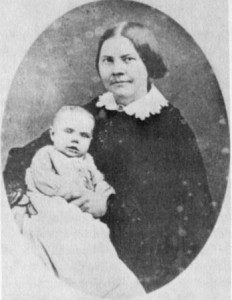I, Leslie Dinaberg, nee Dinaberg, am a Lucy Stoner. This may surprise some people-or explain some things about how I write my columns-but the time has come to discuss my radical views.
I don’t think of myself as an extremist, but I guess I am, at least according to a survey done by the Center for Survey Research at Indiana University. In a national poll, 71 percent of respondents agreed that it is better for women to change their name upon marriage.
Seriously, this study was presented at the American Sociological Association’s Annual Meeting. Seventy-one percent!
That just blew me away. Unlike Lucy Stone (1818-1893), an American suffragist and abolitionist married to Henry Blackwell, who made a national issue of the right to keep one’s own surname as part of her efforts for women’s rights, most women who marry today still take their husband’s name.
An informal study of the holiday cards we received this year backs up that data. The vast majority of my high school and college friends who are married took their husband’s name.
For the most part these are not women who moved from their parents’ homes in with their husbands. These are not shrinking violets by any means. These are accomplished women with educations, careers, and independent lives. So why did they change their names when they got married?
I wish I could say I understood it. But honestly, I don’t. When my sister got married and changed her name she said it was because they wanted to be Duggan Family, not the Dinaberg-Duggan Family.
I agree, hyphens can be awkward. Zak and I briefly discussed hyphenating our names when we got married, but “Dinaberg” is a mouthful all by itself and when you add “Klobucher” to it there’s no way we’d ever be able to fit it all on a credit application. “Kloboberg” and “Dinucher” didn’t exactly roll off the tongue either. Besides, I’d been Leslie Dinaberg for almost 30 years at that point. I had no interest in becoming someone else when I got married.
I kept my name because it was my name-I was used to it, and replacing it with my husband’s made me feel like I was pretending to be my mother-in-law. I didn’t want to slam the door on the person I had worked so hard to become; besides, I was the last of the Dinabergs with no sons in my generation to “carry on” the name. Despite the mispronunciations, I just couldn’t stomach being the one to kill it off.
Piercings and tattoos have become commonplace, and pantyhose are harder and harder to find, but in this one area people have stayed conservative. I don’t get it. The number of women (5-10 percent) who have kept their names has held steady since the baby-boom generation began to marry, according to a New York Daily News interview with Lauren Hamilton, one of the Indiana University researchers. “The results were surprisingly conservative,” she said. “Even though there is a general movement toward neutral language, like saying chairperson instead of chairwoman, people seemed to feel it was better for a woman to change her last name to her husband’s.”
“The figures were a bit sobering for us because there seems to be change in so many areas. If names are a core aspect of our identity, this is important,” said Brian Powell, another researcher at Indiana University. “There are all these reports and indicators that families are changing, that men are contributing more, that we’re moving toward a more equal family, yet there’s no indication that we’re seeing a similar move to equality when it comes to names.”
“A wife should no more take her husband’s name than he should hers. My name is my identity and must not be lost,” said Lucy Stone. Get it? Women who choose not to use their husbands’ surnames are called “Lucy Stoners”-or Leslie Dinabergs.

